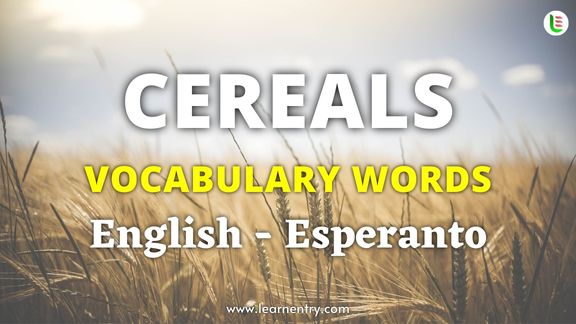Cereals names in Esperanto and English
To learn Esperanto language, common vocabulary is one of the important sections. Common Vocabulary contains common Esperanto words that we can used in daily life. Cereals are one part of common words used in day-to-day life conversations. If you are interested to learn Cereals names in Esperanto, this place will help you to learn all Cereals names in English to Esperanto language. Cereals vocabulary words are used in daily life, so it is important to learn all Cereals names in English to Esperanto and play Esperanto quiz and also play picture vocabulary, play some games so you get not bored. If you think too hard to learn Esperanto language, then 1000 most common Esperanto words will helps to learn Esperanto language easily, they contain 2-letter words to 13-letter words. The below table gives the translation of Cereals vocabulary words in Esperanto.

Read also: A-Z Dictionary | Quiz | Vocabulary | Alphabets | Grammar
List of Cereals names in Esperanto
Here is the list of Cereals in Esperanto language and their pronunciation in English.
Cereals names - Esperanto
| Barley | hordeo |
| Maize | maizo |
| Millet | milio |
| Oat | aveno |
| Rice | rizo |
| Sorghum | sorgo |
| Rye | sekalo |
| Wheat | tritiko |
| Paddy | irlandano |
| Grain | greno |
| Maida | maida |
| Biscuit | biskvito |
| Bran | bran |
| Bread | pano |
| Broth | buljono |
| Butter | butero |
| Cheese | fromaĝo |
| Coffee | kafo |
| Flour | faruno |
Top 1000 Esperanto words
Here you learn top 1000 Esperanto words, that is separated into sections to learn easily (Simple words, Easy words, Medium words, Hard Words, Advanced Words). These words are very important in daily life conversations, basic level words are very helpful for beginners. All words have Esperanto meanings with transliteration.
Daily use Esperanto Sentences
Here you learn top Esperanto sentences, these sentences are very important in daily life conversations, and basic-level sentences are very helpful for beginners. All sentences have Esperanto meanings with transliteration.
| Good morning | Bonan matenon |
| What is your name | Kio estas via nomo |
| What is your problem | kio estas via problemo? |
| I hate you | mi malamas vin |
| I love you | mi amas vin |
| Can I help you | Ĉu mi povas helpi vin? |
| I am sorry | mi bedaŭras |
| I want to sleep | mi volas dormi |
| This is very important | Ĉi tio estas tre grava |
| Are you hungry | Ĉu vi malsatas? |
| How is your life | kiel fartas via vivo? |
| I am going to study | mi iras studi |
Esperanto Vocabulary
Quizzes
Esperanto Grammar

Fruits Quiz

Animals Quiz

Household Quiz

Stationary Quiz

School Quiz

Occupation Quiz